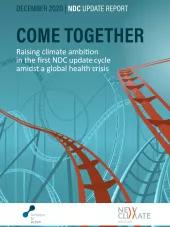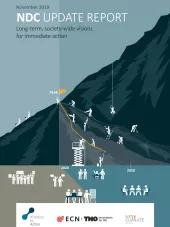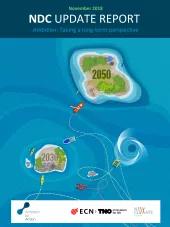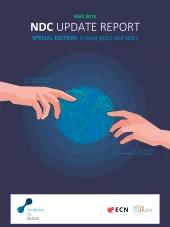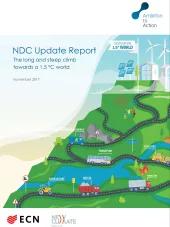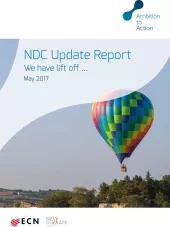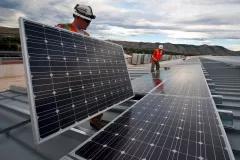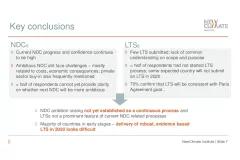In this edition of our annual NDC Survey we once again find optimism and confidence about progress made on Nationally Determined Contribution (NDC) planning and implementation. Based on responses from 97 policy makers and experts across 92 countries, we discuss how updated NDCs show progress, how they are linked to long term strategies, and which persistent challenges remain. Our survey findings confirm that we have come a long way since the 2015 Paris Agreement. However, we cannot ignore the fact that progress is too slow, pledges are insufficient, and action is not convincing: not on reducing current emissions, not on climate finance, and not on credible and detailed long-term plans to full decarbonisation. It is time to pull the emergency brake: all actors, including national and subnational governments, need to put forward bold climate pledges, carefully consider socioeconomic impacts, and back up commitments with concrete plans and real action.
Survey respondents communicated significant progress of their countries’ updated NDCs - but collective ambition remains insufficient. Almost all (95%) indicated that their country has added or strengthened greenhouse gas GHG) emissions targets (see Figure 1). Most progress can be observed in the grounding of NDCs, especially at the sector level: countries added new sector-specific targets, developed sector-level plans, or secured political support from line ministries. Respondents indicate slower progress in obtaining sufficient buy-in from the private sector and securing funds for NDC implementation. As in previous editions, financial barriers remain a major obstacle to raising climate ambition.
The development of long-term strategies (LTSs) faces substantial delay in many countries. As of October 2021, only 33 countries (17% of Parties) have communicated an LTS to the UNFCCC. Of our respondents, only a quarter stated that their country is currently developing an LTS. This suggests that many countries have no imminent plans to develop one, risking a disconnect between their NDC and long-term commitments.
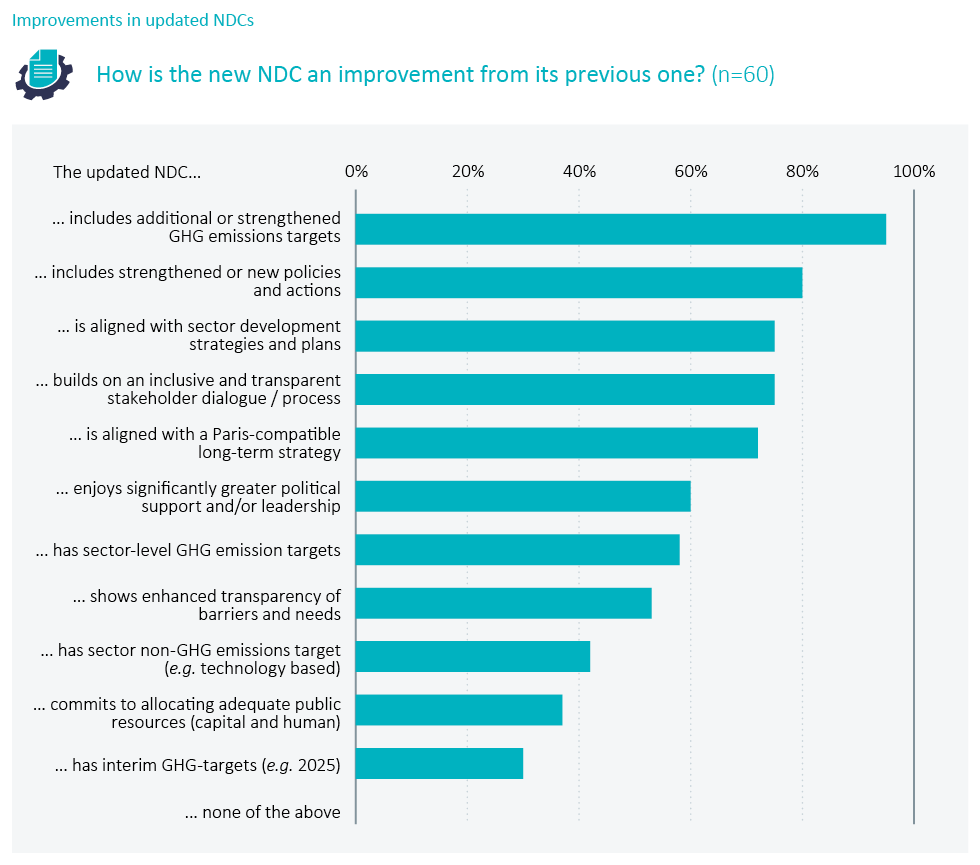 Figure 1: Improvements in updated NDCs.
Figure 1: Improvements in updated NDCs.
SUBNATIONAL ACTORS: ACHIEVING MORE FASTER
The role that subnational actors, such as local and regional governments, play in climate change mitigation and adaptation action is critical to achieve the global goals of the Paris Agreement. Only if all actors across all levels of government significantly increase their climate ambition, can the Paris temperature goals remain within reach. Momentum for subnational climate action is building up around the world. This is reflected in an increasing number of initiatives created alongside the UNFCCC process, promoting stronger collaboration between all actors to jointly push the climate agenda. Recent analyses point out that the contribution of subnational governments to more ambition and faster action can be substantial – far beyond what is currently achieved by national governments alone.
For most respondents (80%) it is clear that subnational governments play an important role in NDC implementation. For more and more countries this acknowledgement is matched by actual involvement of subnational governments in NDC planning (75%). Many of our respondents state that subnational governments have put climate targets in place to support NDC implementation (60%) (see Figure 2).
There are several governance aspects that need to be better understood to fully harness the potential of subnational actors. Effective climate action by subnational governments depends heavily on the powers and capacities they have to act in and across sectors. While governance structures can boost or limit climate ambition top-down and bottom-up, there are opportunities for national and subnational governments to iteratively support each other in their efforts to ratchet up.
Looking forward, increased transparency and accountability for subnational climate action can drive ambition and dynamism in the NDC process. Concepts like Regionally and Locally Determined Contributions hold the potential to localise and further align the climate and sustainable development agendas.
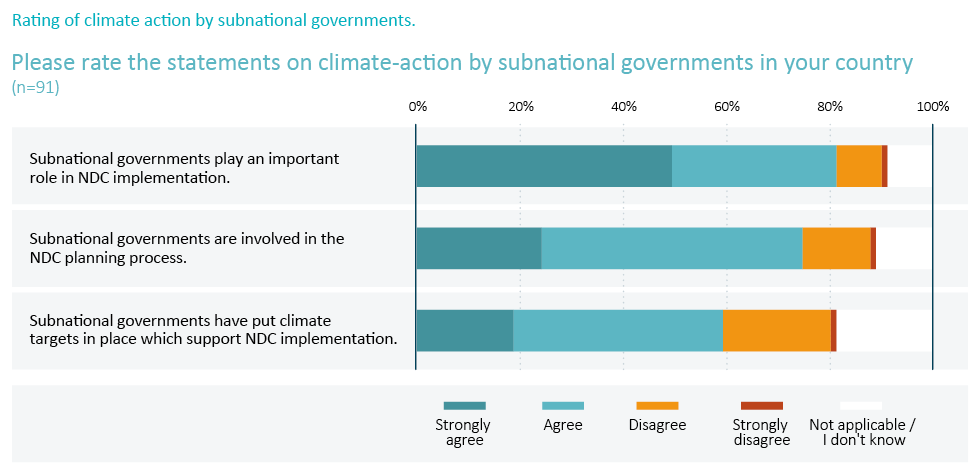 Figure 2: Rating of climate action by subnational governments.
Figure 2: Rating of climate action by subnational governments.
BEYOND THE SMOKESCREEN: IT’S ACTIONS THAT MATTER
Since the start of the COVID-19 pandemic, governments have responded by injecting vast sums of money to get economies back on track as quickly as possible. Narratives around co-benefits of climate action suggested an overwhelmingly strong case for a green recovery and leaders committed to building back better. We argue that these narratives can indeed be powerful but should not be used as a smokescreen to cover up inaction or delay; it’s actions that matter.
Many linkages between climate actions and development outcomes can be positive, in which case objectives are mutually reinforcing, but the two are not always neatly aligned and they may involve difficult trade-offs or unrecoverable costs. We are running out of time and no longer have the luxury to focus only on win-win propositions or postpone decisions on climate action until innovation brings down the costs. Where there are trade-offs, sometimes hidden, across aspects of development (i.e. SDGs), between groups of stakeholders, or across current and future generations, these need to be well-managed to ensure a just transition.
Our survey results show that alignment of SDGs and NDCs is stronger than in previous editions. However, despite mounting evidence of co-benefits, it is not straightforward to turn this evidence into higher ambition and faster action. Looking ahead, we expect co-benefits analyses to be especially relevant for NDC implementation through local climate action, for assessing interactions with resilience and adaptation, and for planning inclusive and fair transitions.
PERSPECTIVES ON THE ROLE OF SUB NATIONAL ACTORS IN IMPLEMENTING NDCs
The successful implementation of (updated) NDCs will require efforts by all stakeholders – especially from subnational actors closer to the local context. Guest contributions cover the need to turn pledges into deeds (WRI), technical assistance provided to national governments to integrate subnational actors (NDC Partnership), recommendations on the type of support that national governments can provide to regional governments (ICLEI World Secretariat), and how better exchange between national and regional governments can raise national climate ambition (Under2 Coalition). The last two contributions focus at city-level climate action: BUND makes the case that several cities are front-runners in climate action and GIZ discusses the need of financial support to implement city-level climate measures. The NDC Update Report series is part of the AmbitionToAction project.


